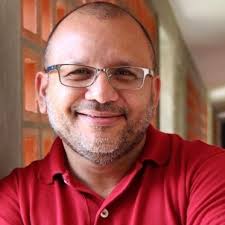Key Findings
In Latin America, several countries’ laws permit the president to commandeer all radio and television broadcasts. Initially contemplated for use in rare circumstances such as national emergencies, a few leaders in the region, beginning with Venezuela’s Hugo Chávez, have taken advantage of these laws to create an unprecedented media bully pulpit that has been an essential part of their populist politics. This report explores how these obligatory presidential broadcasts have become a routine occurrence in Venezuela, Argentina, and Ecuador with troubling implications for public debate. The report also surveys the legal and regulatory frameworks across the region for lessons on how presidential communication authority can be restricted to prevent this kind of abuse in the future.
Introduction
When Venezuelan opposition leader Jesús Torrealba held a much anticipated rally in September 2016, only one television channel, Globovisión, was willing to broadcast it. By then, the 24-hour news channel stood alone as the one major broadcaster daring enough to air critical coverage of the government.
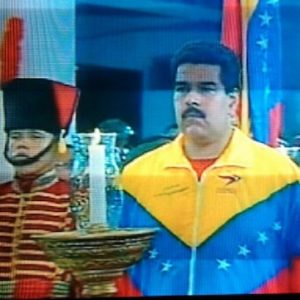
Venezuelan President Nicolas Maduro on a television broadcast March 6, 2013, photo by Quelverd Arias Camargo, Creative Commons
The speech was particularly newsworthy because Torrealba that day was planning to call for nation-wide protests in favor of a referendum on President Nicolás Maduro. The Venezuelan constitution allows for what is essentially a recall by plebiscite if citizens can marshal enough signatures in favor of one, but the country’s electoral commission, Torrealba alleged, was stonewalling the process in spite of the opposition’s success at collecting the signatures. He had hoped his speech could provoke demonstrations of irrefutable public support for the referendum.
After only a few minutes at the podium, however, the transmission of his speech was interrupted without warning.1 President Maduro had ordered a blanket broadcast across all radio and television stations–what is known in Spanish as a cadena nacional. These presidential broadcasts resemble a US Oval Office address in style, but in Venezuela the law obliges both state‑owned and private media to carry the transmissions, which have lasted as long as eight hours. When Maduro invoked this law to interrupt Torrealba’s speech, Venezuelans had no choice but to listen to Maduro or simply switch off their TVs and radios.
This is not an isolated event. The abuse of presidential broadcast laws, which was first witnessed in Venezuela under Maduro’s predecessor, Hugo Chávez, has become a source of concern in several countries in the region, including in Argentina and Ecuador.2 This report looks at how obligatory presidential broadcasts have risen with a wave of populist authoritarian governments in Latin America, and how the abuse of such transmissions, coupled with other efforts to suppress independent press, has been a significant detriment to democratic deliberation. By looking at legal restrictions on this practice in the region, the report also provides some insight into how the abuse of obligatory presidential transmissions could be curtailed.
Chávez: pioneer in bully pulpit broadcasting
Hugo Chávez attempted a coup d’état on February 4, 1992, aimed at overthrowing President Carlos Andrés Perez, who had become deeply unpopular amid embezzlement allegations and an economic and political crisis brought on by the deregulation he had enacted. Chávez was apprehended in the unsuccessful ploy and sent to prison, but had become something of a national folk hero in the process. Later released from prison after Perez had been forced out of office, the former paratrooper and a political outsider was elected President in 1998 on a promise to alleviate poverty and give power to those who felt ignored.
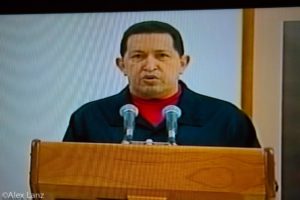
President Chavez speaks on Venezuelan television January 15, 2013. Photo by Antonio Marín Segovia, Creative Commons.
Chávez concentrated quickly on eliminating his political enemies. For a brief period, the private media were not a target, but as the press began to cover Chávez’s political maneuvers critically, the relationship soured. Chávez’s fiery rhetoric against private media provoked attacks by his supporters against journalists, and then the government itself began to take aim at independent news outlets. The government refused to renew the broadcast license of privately-owned broadcaster RCTV following its critical coverage, and various journalists found themselves facing detentions, threats, and criminal defamation suits for their coverage of government officials. Venezuela’s once vibrant media system has been dramatically diminished under the myriad pressures, and Chávez and Maduro have sought to fill that gap with direct communication.3
Before Chávez, the use of obligatory presidential broadcasts in Venezuela was limited to a scattering of brief messages issued by the head of state throughout the year, often transmitting an official ceremony on a national holiday or the arrival of a foreign dignitary. On February 2, 1999, the day that Chávez took office, that changed. On the day of his inauguration, four presidential blanket broadcasts were transmitted for a total length of eight hours and 14 minutes, a record length for a transmission of this kind. 4
Eleven years to the day after his inauguration, on February 2, 2010, President Chávez issued his 2,000th obligatory broadcast on radio and television. During his lengthy administration, the Venezuelan head of state addressed the nation using this mechanism on average of once every other day, co-opting soap operas, news, programming for children and any other transmission that happened to be airing at the time. 5 According to the Inter‑American Commission of Human Rights, “Venezuelan media transmitted a total of 1,923 presidential broadcasts, equivalent to 1,252 hours and 41 minutes; in other words, 52 days of uninterrupted broadcasting of presidential messages.”6 The Inter-American Commission on Human Rights signaled its concern for how this practice was affecting the environment of democratic deliberation in Venezuela.
Reporters without Borders also used Chávez’s example to highlight the potential for propagandistic abuse of this mechanism, particularly during electoral campaigns when pluralism in media is most essential.7 Such pluralism should be accomplished according to “the principle of a fairly distributed time to speak, which should be guaranteed by the State.” The use of blanket broadcasts clearly contravenes this principle.
In Venezuela, two instances illustrate how the presidential broadcast can be used to unfair advantage preceding an election. On August 15, 2004, Venezuela carried out a recall referendum. The month before the election set a record for the number of blanket broadcasts by the president: Chávez spoke for an average of 45 minutes per day that month on the national radio and television system. 8 Five years later (and still in office), Chávez again used the tool of presidential broadcasts ahead of another referendum, this time on whether to overturn the constitutional restriction on term limits. Just a few weeks before that vote, Chávez had the longest presidential blanket broadcast of his life; he spoke uninterruptedly for seven hours and 34 minutes on a mandatory broadcast.
Though Chávez’s use of blanket broadcasts remains unrivaled, the abuse of the privilege has since spread to other countries in the region.
The cost of Venezuela’s obligatory presidential broadcasts
As part of an initiative to track the abuse of presidential broadcasts known as Cadenómetro (on Twitter: @cadenometro), my NGO, Monitoreo Ciudadano, has sought to quantify the costs of radio and television transmissions by President Nicolás Maduro in Venezuela in May, 2016. During that month, the Venezuelan president issued 16 national radio and television blanket broadcasts for a total of 20 hours, six minutes, and 42 seconds. Conservatively estimating the cost of a broadcast minute in Venezuela at $1,300 (a figure we confirmed with advertising companies), Maduro’s blanket broadcasts that month totaled $1.6 million.
To grasp the magnitude of this propagandistic expense in the impoverished Venezuelan economy, we need to compare it to another figure. At the beginning of June 2016, Maduro announced with great fanfare–by way of an obligatory radio and television broadcast–a major initiative for indigenous people in Venezuela: government spending to benefit 52,000 families in indigenous communities worth $1.6 million. 9
The Kirchners: presidential broadcasts and propaganda
In the consecutive administrations of spouses Néstor Kirchner and Cristina Fernández de Kirchner, in office in Argentina from 2003 to 2015, radio and television blanket broadcasts were used as part of a propaganda system. Roberto Iglesias, an independent researcher who has examined their consecutive administrations, claims that there were three components to the Kirchners’ communication model. First, the Kirchners sought to polarize public media and to discredit media houses that were critical of them. Second, a number of media houses that seemingly operated privately and independently were, in fact, created and sponsored by the government with the allotment of official advertisement. While the growth of media outlets under the Kirchners was viewed by some as a welcome respite from the domination of the Clarín group, others have interpreted the media tactics of both administration as significantly weakening independent press outlets. Finally, according to Iglesias, they tried to asphyxiate truly independent media through a number of different strategies. For instance, they would withhold state advertising from targeted media houses and would interrupt their daily programming with the mandatory presidential broadcasts on radio and television.10
The legal ability of presidents to commandeer the airwaves was established in the 1940s by President Juan Domingo Perón, though had never previously been used for purposes of state propaganda. “Before Néstor’s administration, there was a tradition of blanket broadcasts for matters of high institutional relevance, such as the launch of a significant financial plan or a presidential address regarding a serious political crisis, and it was accepted because these instances called for the country to gather and listen to the President,” said Fernando Ruiz.11
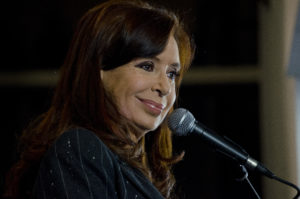
Argentine President Cristina Kirchner, photo by the Argentine Ministry of Culture, Creative Commons.
Cristina Fernández’ deployed mandatory broadcasts only when it suited her political interests. “The contradiction, and this was something she was criticized for, is that when there was an event of institutional transcendence, Cristina Fernández kept quiet. For example, with the murder of attorney general Alberto Nisman, she made no statements whatsoever for days.” On the other hand, her disappearance during tense moments had a counterpoint: “… announcements of things that never even materialized; a number of these mandatory broadcasts announced projects, buildings and programs that were never executed.” 12
Live from Carondelet: cutting off information from “the domestic enemies”
Rafael Correa came to power in 2007 on the populist wave of Latin American left-wing presidents. And like his predecessors, he promised to give power to poor people through social and economic reforms and subsequently waged war against any press organization critical of his administration. As in Venezuela, Ecuador’s criminal libel laws have been used harshly against high-profile journalists with a chilling effect. And the country’s 2013 Communications Law has given a government-controlled regulator broad discretion for issuing sanctions against journalists, including, for instance, against one newspaper for failing to cover a public speech by a mayor that the regulator had deemed to be “of public interest.”13
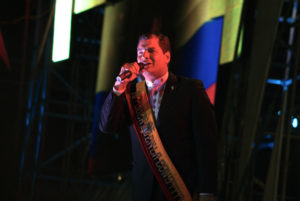
Photo of Rafael Correa May 24, 2013, by Ecuador’s Coordinating Ministry of Economic Politics, Creative Commons
With private media increasingly shackled, Correa has adopted a similar strategy to his counterparts in Venezuela and Argentina by taking advantage of his ability to commander the airwaves and by using his platform to attack his rivals and private media. In June 2007, a few months after he assumed power, President Correa warned during one of his broadcasts that “some newspapers and media are against the government,” announcing that he would not hold any more press conferences.14
The Office of the Special Rapporteur for Freedom of Expression of the Inter‑American Commission on Human Rights (IACHR) of the Organization of American States (OAS) has shed light several times on Correa’s practice of issuing blanket broadcasts to interrupt journalistic programs that accuse or question his government. In its 2014 report, the office points out that Correa’s government has continued to use mandatory broadcasts in the recent years, often forcing his messages to air only on broadcasters that have been critical of his administration. On January 8, 2013, for instance, the National Secretary Office for Communication (SECOM) interrupted the interview show Los Desayunos 24 Horas, which airs on the channel Teleamazonas, for eight minutes to deny the claims made by a congressman on a previous episode. That congressman had alleged that the head of the National Financial Corporation had committed a crime by holding public office while being a debtor to the state.
Teleamazonas’ newscast was again disrupted on January 29 by an obligatory broadcast to defend the Minister for Natural Non-Renewable Resources and discredit the media and their interviewees. The goal of the mandatory government transmission during Teleamazonas’ interview show Los Desayunos 24 Horas was to refute an allegation that the minister did not have a professional degree and had a conflict of interest because he had relatives presumed to be working in private oil companies. The mandatory transmission claimed that Teleamazonas “twisted the truth to cause damage.”
On May 10, 2013, the National Secretary Office for Communication (SECOM) broadcasted a message during a show on the Ecuavisa television channel to challenge the allegation by NGO Fundamedios that 172 acts of aggression had been committed against media outlets and journalists in Ecuador in 2012. The message criticized the work of Fundamedios, and insinuated that the organization was pushing a foreign agenda, pointing to how the NGO had received funds from the United States Agency for International Development (USAID). Days before, César Ricaurte, a representative of Fundamedios, was interviewed in Ecuavisa and reported about the “hostile climate” faced by journalists in the country.
A former general manager of Ecuador’s public television, Enrique Arosemena, claims that “Correa’s communication scheme is astonishing. It is the first time in the history of Ecuador that a government has issued so many blanket broadcasts. Correa realized the importance of the media.” 15 According to Fundamedios, in 2016, Correa issued a record number of mandatory broadcasts: an astonishing 2,405.
The necessary restrictions on presidential broadcasts
It is clear from these examples that mandatory blanket broadcasts for radio and television are a crucial part of a populist model of politics in these Latin American governments. “The president creates an event that is transmitted in a mandatory broadcast and introduces new topics to the public agenda that are also covered by the media.” 16 And frequently, as part of this strategy, private mass media are attacked from the bully pulpit in order an effort to discredit them. 17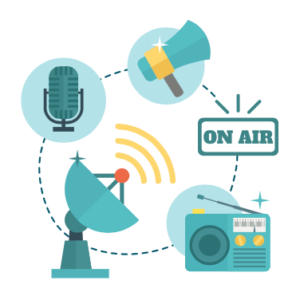
Moreover, the nature of the transmission itself bolsters the populist image of the leaders. Mariana Bacalao, a professor at the Universidad Simón Bolívar in Caracas, suggests that the messages transmitted via obligatory broadcasts have efficiently “sold” a model of inclusion to the traditionally excluded and marginalized sectors of society; a communication space designed for the popular sectors, thus leaving them with the sensation of being considered by the powerful. 18
Avoiding such abuses of presidential broadcasts may not require their elimination, but a stricter regulation of their content and use. In an analysis of Latin America, the Office of the Special Rapporteur for Freedom of Expression of the IACHR has recognized the legal authority of the president and high-ranking state officials to use the media to inform the population about public interest matters. However, the exercise of this authority is not absolute: the information shared by governments to their citizens through presidential blanket broadcasts must be strictly necessary to attend to urgent information needs in areas of clear and genuine public interest, and should not exceed the minimum time needed to communicate such information. In this sense, the IACHR has made it known that applying international standards in the subject of freedom of expression and a right to information, “not just any information justifies the interruption by the President of the Republic of regularly scheduled programming. Rather, it must be information that could be of interest to the masses, informing them of facts that could be of public significance and that are truly necessary for real citizen participation in public life.”19 One country illustrates the effectiveness of proper regulation: Bolivia.
President Evo Morales (in office since January, 2006) has assumed a similarly confrontational posture with media in his country. However, Morales has not made use of mandatory transmissions like his counterparts in Venezuela, Ecuador, and Argentina. The difference in the cases owes much to Bolivia’s laws and regulations. In the General Telecommunications Law and Information and Communication Technologies (Ley General de Telecomunicaciones y Tecnologías de la Información y Comunicaciones) of 2011, one article stipulates that the media must broadcast a presidential report twice per year: on August 6, Bolivia’s Declaration of Independence, and January 22, the day of the “reconstitution of the State.” Beyond that, however, the president in Bolivia has no authority to commandeer private transmissions.
The legal restrictions on obligatory presidential broadcasts in Bolivia, though, have not prevented Morales from making use of state-operated television and radio. Morales and his vice-president, Álvaro García Linera, are often featured on state broadcasts attending events. When Morales occasionally plays in an exhibition soccer match with a local teams, those games are broadcast live, in their entirely, and with professional commentators!
It may be difficult for states to change such regulations while under the current leadership of populists, but many states can act preemptively. The Organization of American States would be wise to issue guidance to its members on this issue.
Legislation in Latin America
In 2014, the Regional Alliance for Freedom of Expression and Information issued the most complete report so far to document Latin American legislation on the subject of obligatory transmissions by governments. 20 Drawing from this report, the following paragraphs summarize the laws governing presidential broadcasts in several countries.
- In Argentina, the regulatory framework for national blanket broadcasts is included in the Audiovisual Communication Services Law (Ley de Servicios de Comunicación Audiovisual) No. 26.522 and Regulatory Decree No. 1225/103. Article 75 regulates this matter, setting forth: “National or regional blanket broadcasts. The national and regional Executive Powers may, in serious, exceptional, or institutionally transcendent situations, arrange the transmission of a national or regional blanket broadcasts, as the case may be, of mandatory transmission for all licensees”.
- Meanwhile, in Brazil, a regulation issued during the years of military dictatorship is still in force. Decree 84.181 of 1979 sets forth the possibility for the highest authorities of the Executive, Legislative, and Judicial Powers to request the President of the Republic to transmit national blanket broadcasts in cases of public utility. After the military dictatorship in Chile, all mandatory transmissions were eliminated, with the exception of blanket broadcasts related to electoral propaganda included in Law 18.700.
- In Colombia, Article 32 of Law 182 of 1995 sets forth the president’s option to use television channels to broadcast messages. Originally, this regulation stated, “The President of the Republic may use television services to address the country in any moment and without any limitation whatsoever.” However, sentence C11772 of 2001 of the Colombian Constitutional Court determined the final section of this article to be “unenforceable” “without any limitation whatsoever,” thus rendering it without legal effect.
- In Ecuador, this topic has been explicitly regulated by President Rafael Correa. On June 25, 2013, the Organic Law of Communications (Ley Orgánica de Comunicación) entered into force. Article 74 reads as follows: “Broadcast Media Obligations. The broadcast media are obligated to provide the following social information services of general interest at no cost: 1. Transmit in a national or local blanket broadcast in all or several communication media the general interest messages requested by the President of the Republic and/or the entity of Executive Function with this competence (…) 2. Transmit in a national or local blanket broadcast in the state of emergency instances defined in the Constitution of the Republic the messages requested by the President of the Republic and/or the authorities appointed for this purpose.”
- In El Salvador, the Telecommunications Law (Ley de Telecomunicaciones) of 1997 says: “The President of the Republic will have the right to convoke all radio and television stations of the country to a national radio and television blanket broadcast due to war, invasion of territory, rebellion, uprising, catastrophe, epidemic, or other disasters, serious disturbances of public order, or a message of national interest”.

- As a result of the historical authoritarian experience in Peru, there is no regulation governing the use of national blanket broadcasts for messages determined by the president. The media (including radio and television) are not obligated to transmit national blanket broadcasts.
- Finally, national blanket broadcasts in Venezuela are explicitly included in the Organic Law of Telecommunications (Ley Orgánica de Telecomunicaciones) of 2000 in a rather wide‑ranging manner, thus practically allowing the chief of state to order a mandatory broadcast, evenwithout a compelling reason. Article 192 of the Venezuelan law states: “Without prejudice to the legal provisions in security and defense matters, the President of the Republic may order, directly or through the National Telecommunication Commission, cable television service providers through their information channel, and radio and open television broadcasting companies to broadcast official messages or addresses from the Office of the President or Vice‑President of the Republic or Ministers at no cost. The modalities, limitations, and further characteristics of such broadcasts and transmissions will be determined via regulation”. Such regulation, however, has not been issued by the Venezuelan state, neither under Chávez nor Maduro’s presidency, thus preserving the ruler’s extensive capacity as there is no limitation whatsoever.
Footnotes
- The original video in Spanish is available at https://www.youtube.com/watch?v=jHqX5CE3g-Q&feature=youtu.be
- Martín Dinatale and Alejandro Gallo, Luz, cámara… ¡Gobiernen! Nuevos paradigmas de la comunicación presidencial en América Latina (Buenos Aires: Konrad Adenauer Foundation, 2009). http://www.kas.de/wf/doc/17568-1442-4-30.pdf
- Monica Campbell, Venezuela’s private media wither under Chávez assault (Washington, D.C.: The Committee to Protect Journalists, 2012).
- Andrés Cañizález, Pluralismo menguante: Elecciones y libertad de expresión en Venezuela (Salamanca: Editorial Comunicación Social, 2014).
- On February 13, 2009, the international network Reporters without Borders issued a statement alerting on the impact of Chávez’s obligatory broadcasts and presidential addresses in the context of the election campaign for the referendum that year.
- CIDH, Democracia y Derechos Humanos en Venezuela (Washington, D.C.: Comisión Interamericana de Derechos Humanos, 2009). https://www.cidh.oas.org/countryrep/Venezuela2009sp/VE09.indice.sp.htm
- Reporters without Borders statement, February 13, 2009.
- Cañizález, Pluralismo menguante.
- Andrés Cañizález, “El presidente que hablaba demasiado,” Monitoreo Ciudadano, June 22, 2016, http://monitoreociudadano.org/yomonitoreo/2016/06/presidente-hablaba-demasiado-infocracia/.
- Personal interview with Roberto Iglesias (August 13, 2016).
- Personal interview with Fernando Ruiz (September 7, 2016).
- Personal interview with Adriana Amado (August 22, 2016).
- For more information on how laws have been used in Ecuador to curtail journalistic independence, see Freedom House’s on-line report on freedom of the press in the country: https://freedomhouse.org/report/freedom-press/2016/ecuador.
- CIDH, Relatoría para la Libertad de Expresión de la CIDH (Washington, D.C.: Comisión Interamericana de Derechos Humanos, 2007). http://www.cidh.oas.org/annualrep/2007sp/Anual%202007%20Vol.%20II%20esp.pdf
- Personal interview with Enrique Arosemena (August 18, 2016).
- Carlos Delgado Flores “Cuando se ablandan las cadenas,” Comunicación, No. 154, 2001, http://gumilla.org/biblioteca/bases/biblo/texto/COM2011154_6-12.pdf.
- Elena Block, “Populismo, libertad de expresión y ciudadanía,” Comunicación. No. 149, 2009, http://gumilla.org/biblioteca/bases/biblo/texto/COM2010149_64-72.pdf
- Mariana Bacalao, “Opinión pública en Venezuela,” Comunicación. No. 147, 2009, http://gumilla.org/biblioteca/bases/biblo/texto/COM2009147_12-16.pdf.
- CIDH, Relatoría para la Libertad de Expresión de la CIDH (Washington, D.C.: Comisión Interamericana de Derechos Humanos, 2014). http://www.oas.org/es/cidh/expresion/docs/informes/2014_04_22_ia_2013_esp_final_web.pdf
- Alianza Regional por la Libre Expresión e Información, Herramientas del Estado para el Control de la Información: Cadenas Nacionales, 2014, http://www.alianzaregional.net/acciones/investigacion-aplicada/alianza-regional-presenta-el-informe-herramientas-del-estado-para-el-control-de-la-informacion-cadenas-nacionales-en-el-marco-del-dia-mundial-de-la-prensa/.

